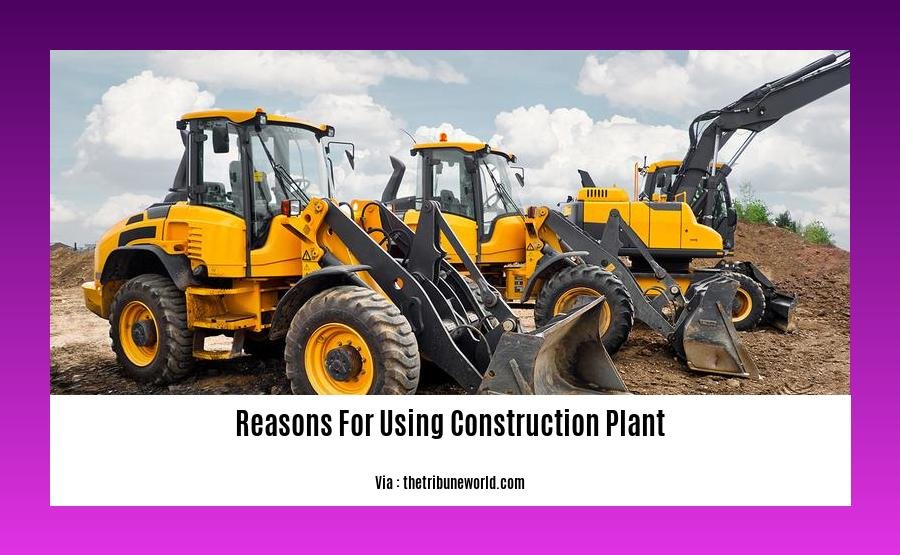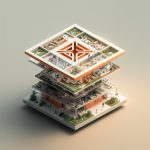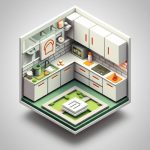Reasons for Using
Construction Plant: Unlo
cking Efficiency, Safety, and Precision
Key Takeaways:
- Construction plant boosts productivity and efficiency on construction projects.
- Specialized machinery enhances construction quality and precision.
- Effective plant management prioritizes safety, equipment selection, and maintenance.
- Construction plant encompasses various categories, including excavating, compacting, concreting, lifting, and transporting equipment.
Reasons for Using Construction Plant
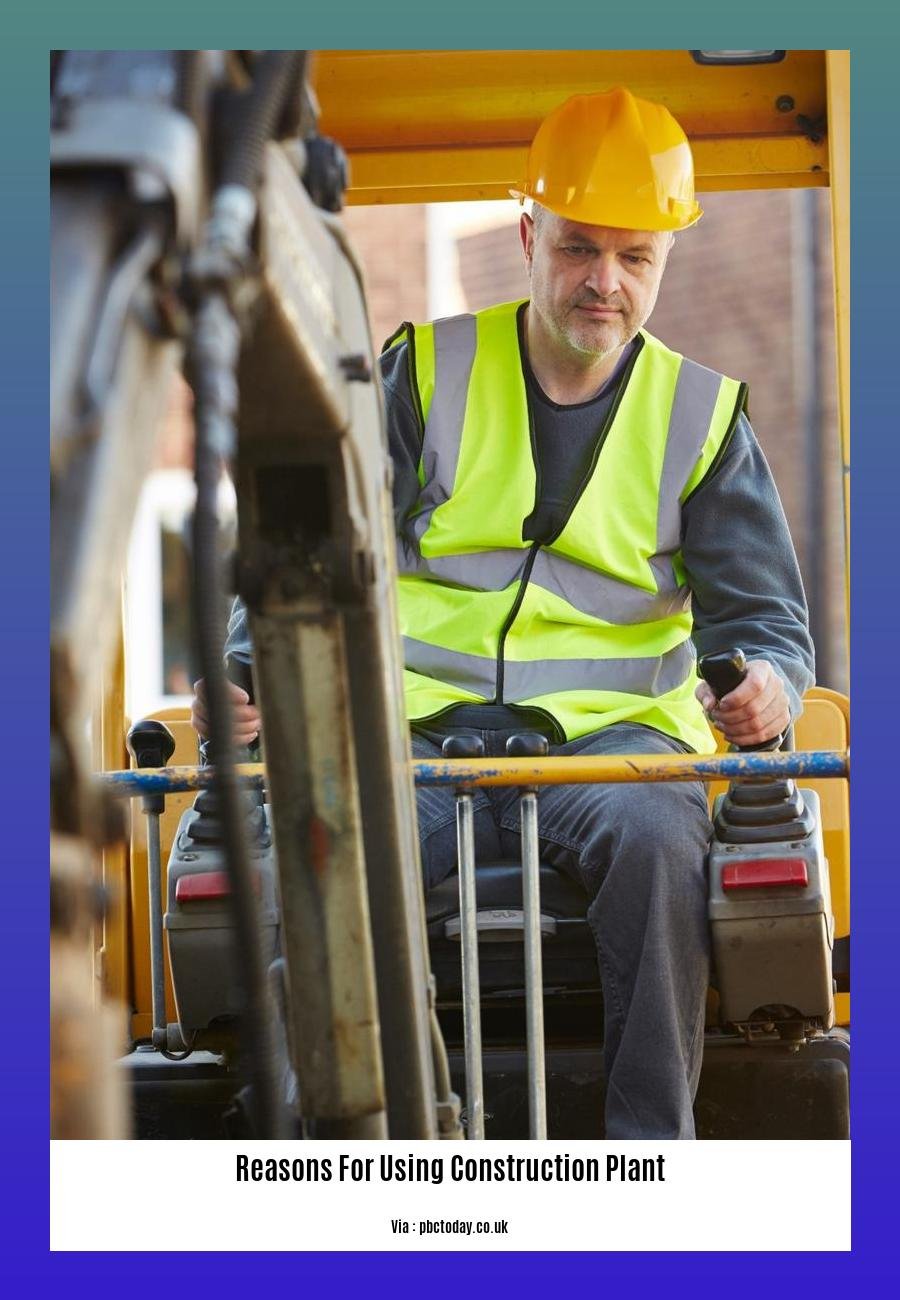
In the world of construction, the use of construction plant is indispensable. These machines are not just tools; they are the backbone of modern construction projects, enabling us to build faster, better, and safer. Here are compelling reasons for using construction plant:
Increased Efficiency and Productivity
Construction plant significantly enhances productivity by automating tasks that would otherwise require manual labor. Machines like excavators, bulldozers, and cranes can perform heavy lifting, excavation, and earthmoving operations with precision and speed, reducing project timelines and costs.
Enhanced Quality and Precision
Specialized construction equipment ensures accuracy and high-quality construction outcomes. For example, concrete mixers ensure proper mixing and pouring, while laser-guided graders achieve precise leveling and grading. This precision translates into durable and long-lasting structures.
Improved Safety
Construction plant promotes safety by eliminating hazardous manual tasks and reducing the risk of accidents. Machines like cranes and aerial lifts provide safe access to elevated areas, while protective enclosures minimize exposure to falling objects and other hazards.
Reduced Labor Costs
While construction plant requires an initial investment, it can reduce labor costs in the long run. By automating tasks and increasing efficiency, fewer workers are needed to complete projects, freeing up resources for other essential areas.
Flexibility and Versatility
Construction plant offers versatility, allowing it to adapt to different project requirements. For instance, excavators can be equipped with various attachments to perform excavation, trenching, and demolition tasks. This adaptability reduces the need for multiple machines and streamlines operations.
Time Savings
Construction plant enables projects to be completed in less time. By automating tasks and increasing productivity, projects can be finished faster, saving on overall construction costs and allowing for earlier occupancy of buildings or infrastructure.
Improved Sustainability
Modern construction plant often incorporates environmentally friendly features. Electric and hybrid machines reduce emissions, while improved fuel efficiency minimizes environmental impact. This aligns with the growing emphasis on sustainable construction practices.
Conclusion
Construction plant is an essential component of modern construction projects. By increasing efficiency, enhancing quality, improving safety, reducing labor costs, providing flexibility, saving time, and promoting sustainability, construction plant empowers us to build better, faster, and more efficiently. Embracing these machines is crucial for the success and advancement of the construction industry.
-
Raw material calculator for house construction can help you estimate the materials you need for your project.
-
RC Construction Equipment Metal is a leading supplier of construction equipment and materials.
-
Ready mix construction is a type of concrete that is mixed and delivered to the construction site ready to be poured.
-
Ready mix construction machinery pvt ltd is a leading manufacturer of ready mix concrete machinery.
-
Rebar meaning in construction is a steel bar that is used to reinforce concrete.
Enhanced Quality of Work: Construction Plant’s Role in Excellence
Construction projects demand precision, durability, and unwavering quality—elements that construction plant effortlessly delivers. These machines aren’t mere tools; they’re partners in progress, empowering professionals to achieve unparalleled results. Here’s how construction plant enhances the quality of work:
Precision and Accuracy:
Automated processes and laser-guided technology ensure accuracy in measurements, material placement, and leveling—a crucial factor for structural integrity and aesthetic appeal.
Uniformity and Consistency:
Construction plant ensures uniformity in concrete pouring, drilling, and surface finishing. This eliminates human error and guarantees consistent quality across the entire project.
Reduced Defects and Rework:
By minimizing errors and ensuring precision, construction plant reduces the likelihood of defects and costly rework, saving time, resources, and reputational damage.
Improved Safety:
Modern construction plant features advanced safety mechanisms, reducing the risk of accidents and ensuring a safer work environment.
Key Takeaways:
- Construction plant enhances quality through precision, accuracy, and uniformity.
- Automated processes minimize defects and rework.
- Advanced safety features protect workers and improve productivity.
Sources:
– Understanding the Key Quality Factors in Construction
– Critical Factors Affecting Quality Performance in Construction Projects
Economic Feasibility: A Cornerstone of Successful Construction Projects
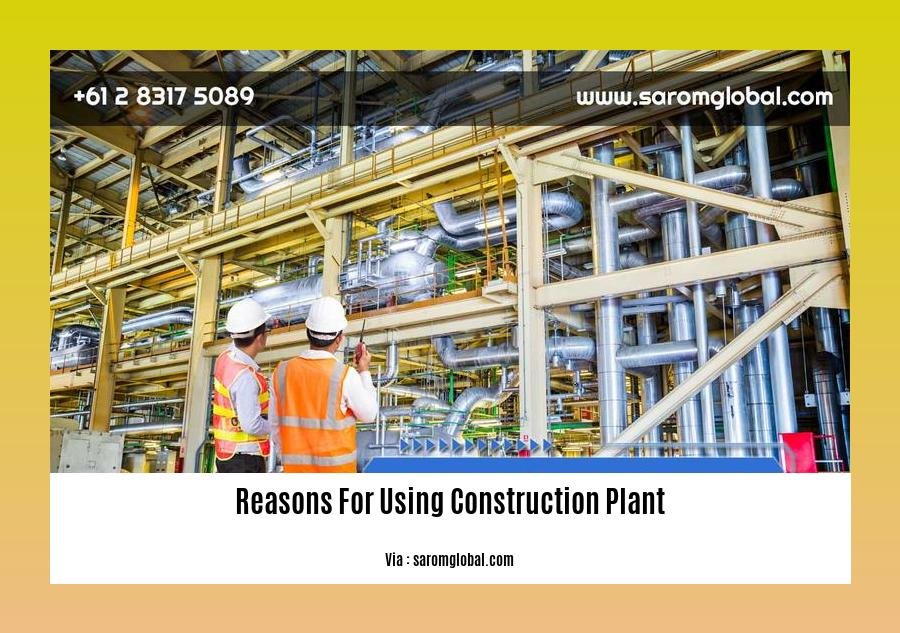
When embarking on a construction project, economic feasibility is paramount—ensuring the project is financially viable and has the potential to generate sufficient revenue to cover its costs. Evaluating economic feasibility involves meticulously assessing the project’s income, expenses, return on investment (ROI), and payback period.
Step 1: Income and Expense Analysis
Detailed financial modeling is essential to accurately forecast a project’s income and expenses. This includes factoring in revenue from sales, rentals, or other sources, as well as operating costs such as materials, labor, and maintenance.
Step 2: ROI and Payback Period
ROI calculates the financial return on an investment, while payback period determines the time it takes to recover the initial investment. These metrics provide insights into the project’s profitability and cash flow timeline.
Step 3: Alternative Scenarios
To account for market volatility and uncertainty, consider various scenarios with different assumptions about factors such as interest rates, rental rates, and construction costs. This provides a comprehensive understanding of the project’s resilience under different conditions.
Step 4: Comparison to Alternative Projects
Evaluating the economic feasibility of a project also involves comparing it to other potential investments. This helps prioritize projects based on their potential return and risk profile.
Factory Planning for Optimal Economic Feasibility
When establishing a production facility, economic feasibility considerations extend to factory planning. Factors like greenfield or brownfield planning, site-specific requirements, and expertise availability significantly impact the project’s budget and viability.
Key Takeaways:
- Economic feasibility is crucial for determining a project’s financial viability.
- Assess income, expenses, ROI, and payback period to evaluate profitability.
- Consider alternative scenarios to account for market uncertainties.
- Compare projects to optimize investment decisions.
- Factory planning factors, such as site selection and expertise, influence economic feasibility.
Relevant URL Sources:
- Economic Feasibility Analysis for Plant Factory Installations
- Evaluating the Economic Feasibility of Plant Factories in Different Markets
Technological Advancements: Empowering Construction with Plant Efficiency
Say goodbye to the days of manual labor and hello to the marvels of Technological Advancements in construction. These indispensable machines have revolutionized the industry, bringing unparalleled efficiency, safety, and quality to every project. Picture this: a towering crane effortlessly hoisting massive steel beams, while agile excavators effortlessly sculpt the earth. That’s the power of construction plant in action.
Benefits of Construction Plant
- Efficiency boost: Machines can handle tasks faster and more precisely than human labor, reducing project time and costs.
- Enhanced safety: Automated processes minimize the risk of accidents and injuries, keeping workers safe.
- Increased productivity: Technological Advancements allow for continuous operation, optimizing output and maximizing project completion speed.
- Improved quality: Precision equipment ensures accuracy in measurements and execution, resulting in flawless construction.
- Sustainable solutions: Electric and hybrid plant options promote environmental responsibility and reduce carbon footprint.
Key Takeaway:
- Construction plant enhances efficiency, safety, productivity, quality, and sustainability on construction projects.
Types of Construction Plant
| Type | Application |
|---|---|
| Cranes | Lifting and positioning heavy materials |
| Excavators | Digging, grading, and trenching |
| Bulldozers | Leveling, clearing, and pushing earth |
| Concrete mixers | Mixing and pouring concrete |
| Road rollers | Compacting and smoothing asphalt and gravel surfaces |
| Generators | Providing electrical power on remote or off-grid construction sites |
Conclusion
Technological Advancements have transformed construction, making it faster, safer, and more efficient than ever before. Construction plant is the backbone of modern construction projects, delivering unparalleled benefits that elevate the industry to new heights. Embrace these advancements and witness the transformative power of construction plant firsthand.
URL Sources
- Construction Plant News: The Benefits of Using Plant Hire
- Caterpillar: Construction Equipment: Types, Uses and Benefits
FAQ
Q1: What is the primary purpose of construction plant?
A1: Construction plant is indispensable for executing construction projects efficiently, safely, and with high quality.
Q2: How does construction plant contribute to increased productivity?
A2: Specialized machinery enables tasks to be completed more swiftly and precisely, maximizing project progress and minimizing delays.
Q3: In what ways does construction plant enhance project quality?
A3: Precision machinery ensures accurate execution of construction operations, resulting in superior workmanship and minimizing defects.
Q4: How does construction plant improve safety on construction sites?
A4: Modern plant is equipped with safety features and operated by trained professionals, reducing risks and creating a safer work environment.
Q5: What are the different types of construction plant used in projects?
A5: Construction plant encompasses a wide range of machinery, including cranes, excavators, bulldozers, concrete mixers, and more, each tailored to specific construction operations.
- Glass Backsplash: Ideas For a Stylish Kitchen Update - December 2, 2025
- Glass On Tile: A Stylish Kitchen Backsplash Option - December 1, 2025
- Glass Tiles for Kitchen: Style and Durability Tips - November 30, 2025
